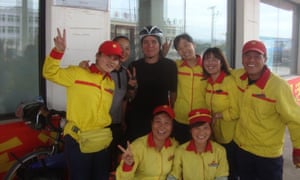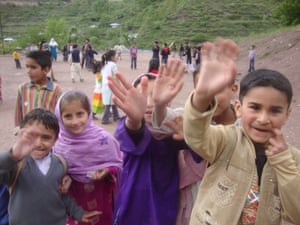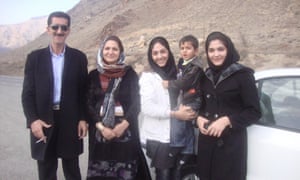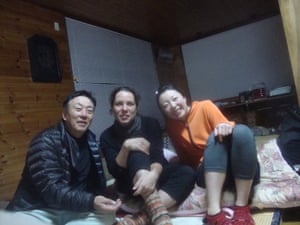From drinking tea with yak herders to battling through the mountains, exploring the world on a bicycle is an adventure like no other – and the best way of meeting the world on its own terms

A new grant, launched by well-known adventurer Tom Allen last week, aims to get young people exploring the world – but with a bicycle and a map, rather than a bus pass and a guidebook. And I’m not surprised. If you ask me, the Janapar Grant formalises a quiet revolution that has been taking place in budget travel for some years.
“Maybe bike touring is the new backpacking,” I remember thinking, as I sipped beers with a pair of Dutchmen in an Irish bar in Hong Kong back in 2012, reminiscing about the last time our paths had crossed, eight months and many thousands of miles ago, in the bitterly cold winter of eastern Turkey.
Because, although right now we looked much like any other scruffy set of travellers, the tales we were swapping weren’t the usual ones of drunkenness and diarrhoea in the cheap bars and hostels we’d found in the same guidebook everyone else was using.
They told me how they’d been brought tea by yak herders after a freezing night in their tent as they battled their way through the Pamir mountains in February. I told them of the petrol stations I’d slept in all across China – how they were usually staffed by a bunch of youngsters a long way from home, sleeping in dorms between their shifts, who saw my arrival as a very welcome break from the monotony of their jobs, and would frequently insist I join them for dinner and sleep between clean sheets in one of their bunkbeds. We beamed at each other as we recalled the solidarity and friendship of truck drivers the world over – how they’d look out for us, cheer us on, and occasionally flag us down to share food and swap life stories.

That sweaty evening in Hong Kong, I realised two things: that bike touring is possibly the best way we have of meeting the world on its own terms, and that bike tourists like ourselves are becoming a common breed. Many of us left our homes imagining we were setting out on a grand adventure, worthy of the history books, or at the very least the record books – and then were nonplussed to find ourselves running into other cyclists at every turn. We’re the equivalent of the hippy trail of the 1970s; the backpacking circuits of the 1990s, the crucial difference being that where we go is constrained only by whether there is a road and sometimes, depending in the thickness of our tyres, not even that.
I came home from my travels a changed woman – but more perplexed by everyone else’s assumption that crossing Asia on a bicycle made me somehow exceptional; that no ordinary person would be brave enough or strong enough to accomplish what for me had been such an enjoyable journey that I carried on for a year and a half.
I was an ordinary person (I still am) and on my journeys I have met countless others – not only the students and engineers and artists and accountants who manage to take a few months or years out of their lives to travel the world by bike, but also the people I met every day, in petrol stations and markets and tiny villages and medium-sized towns, going about their lives, and sharing them with me for the duration of a meal, or a cup of tea, or a night of unexpected hospitality.

These were nothing like the encounters you’ll have in tourist resorts or backpacker districts, where locals tend to be motivated either by what they think you expect of them, or what they expect to get out of you. This was humanity, open and unvarnished.
“But – but isn’t it dangerous?”
(No, not really. Statistically you are more likely to be killed by traffic than terrorists, more likely to be raped by your domestic partner than a foreign stranger.)
“How on earth do you afford it?”
(The usual way, by working hard and saving up. Cycle touring is far cheaper than backpacking, since transport and accommodation can be factored out, and because travelling by bike is absorbing enough that you generally won’t feel the need to splash out on bungee jumps and wild nights out.)
“What if your bike breaks?”
(You fix it. Anyone can learn puncture repair in an hour or so, and if anything more complex goes wrong, there are few places in the world where someone won’t notice your predicament, and take great pride in escorting you to the nearest workshop to get you rolling again.)
I gradually realised that behind these relatively straightforward queries lurked a deeper, more elusive fear. What was it, I wondered, that was stopping people from embracing a style of travel that I had found so abundantly rewarding? Indeed, what was it that had stopped me from travelling this way myself until I was almost in my thirties?
I have already spent several years trying to answer these questions, and to help people overcome the various mental and social obstacles that prevent them from setting out on their own journeys. The Janapar Grant will be another massive boost. Not only will the winner receive an expedition bicycle (donated by Oxford Bike Works), Carradice luggage and a full set of tools and camping equipment – they will also be mentored throughout their journey and preparation by a committee of veteran bicycle travellers.

And unsuccessful applicants won’t be left out. “The application process has been designed as an exercise in visualising the trip and identifying motivations,” says founder Tom Allen. “Regardless of who is chosen, we will be sending all applicants a ‘cycle tour planning kit’ to help bring their ideas to life.”
The grant itself won’t change the world. But it will encourage and enable more young people to discover the world, and the exhilarating diversity and similarity of human life, at a time in their lives when they are most open to it. And that is worth a million bungee jumps.
[Source:- gurdian]















